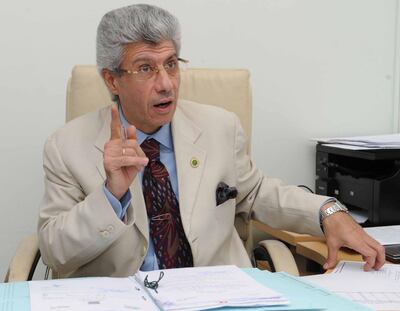Banks and senior legal figures are divided over whether bouncing a cheque should remain a criminal offence, with some calling for the law to be axed and others warning the move could send the wrong signal to scammers and fraudsters.
The CEO of Emirates NBD sparked a renewed debate of the issue when he told a radio station recently that he did not believe it was right that the action could land someone in jail.
But Shayne Nelson drew a clear distinction between account holders that could be punished for making a genuine mistake and fraudsters that use dud cheques to rip people off.
“I would love to see the UAE lose its cheque habit, I don’t believe in a bounced cheque being a criminal offence," Mr Nelson told Dubai Eye.
"One of the reasons landlords hold cheques is because they believe they have leverage over you if something happens and you don’t pay. I don’t believe that’s right for a society."
He said the Federal Bankruptcy Law - introduced earlier this year to allow struggling businesses to manage and restructure and cut the number of company owners fleeing the country - was a step forward.
“It was good to put a bankruptcy law in, but I would like to see it evolve into decriminalising bounced cheques," he told the radio programme.
"I don’t think it’s good for the society as a whole, I don’t think it’s good for the government to put people in jail and have to support them. I don’t see how banks or landlords get paid when someone went to jail.
“For fraud, yes, of course, but sometimes people get in trouble not to their own fault. You see SMEs (Small and Medium Enterprises) get into trouble because someone hasn’t paid them. I think we as a society have to be more balanced on this issue."
Although individual police forces in the emirates publish crime figures from time to time, it is difficult to gauge how many cheque cases are taken to court.
In 2014, Dubai Police said they had handled more than 92,000 complaints between 2011 and 2014, involving Dh33 billion. It resolved more than 55,000 without further action, though that suggests a large number still went to court.
Jamal Al Sumaiti, Director General of the Dubai Judicial Institute, which trains prosecutors and officials for the judiciary, agreed with Mr Nelson and said a bounced cheque that was not amicably resolved should be pursued in the civil courts, without involving police or criminal proceedings.
"A bounced cheque should not be a criminal offence, I agree with bank's CEO," he said.
He also said banks themselves, which have brought many criminal cases over bounced cheques, could avoid the issue if it were a civil matter.
"There is an article called Partial Fulfillment of Cheques, which means that you can pay whatever funds available at time of cashing a cheque instead of having it bounce, which is one solution.
"Let's say you purchased a Dh100,000 item, you issue a cheque with that amount, and the fund available was only Dh60,000."
He said the bank could take that amount then seek to recover the rest in a civil court, rather than launch criminal proceedings, and risk never recovering anything.
According to UAE Penal Code article 401, the articles of the law centre around the 'bad or negative intention' associated with writing a cheque one has no intention of honouring, or writing it in the knowledge there is not enough funds to cover it in the account.
Mahmoud Al Mashhadani, senior legal consultant from the law firm Galadari Advocates, said the law is primarily concerned with these two "elements of crime and that a person is to be held accountable in the eyes of the law,' breaching these.
That suggests the authorities have no intention to pursue the third type of cheque-bouncer - those making an honest mistake - reflected in police forces' willingness to resolve cases before they go any further than the initial complaint.
But other legal figures say any change in the law is likely to send out the wrong message to the first two groups.
Yousuf Al Bahar, a leading criminal lawyer from Al Bahar Advocates in Dubai, strongly disagreed with the call to change the current law.
He said the authorities have sufficient leniency at their disposal to deal with honest mistakes - and sufficient penalties to deal with fraudsters.
"The law does not make a prison sentence mandatory for a bounced cheque offence, leaving it to the judge to consider the conditions related to issuing the cheque and to the defendant's circumstances, which is testament of the law's flexibility" he said.
"Decriminalising bounced cheques and lifting the legal protection it actually provides, may prompt individuals or traders to issue bad cheques knowingly and more often, which may disrupt the economic system in the country," he said.
He added that this could have a knock-on effect when it came to trust and financing, and leave banks scrambling to recover bad cheques.
"If a bad cheque was not a criminal offence and it bounced, the bank will have to go through a long civil process to claim its rights,” he said.

Judge Ayman Abdul Hakam, head of the One Day Court in Dubai, is on the front lines of the issue.
He deals day to day with minor cases and said a large number relate to bounced cheques.
But he also believes the action must remain a crime in the eyes of the law.
“If you take out a loan, if you issue a cheque or if you buy a property, you pay for it with a cheque," he said.
"Then if the cheque is returned showing insufficient funds, you flee the country and the beneficiary cannot get his money back if this were not criminalised. By this being a criminal offence, the law will get to the defendant, through Interpol for example, even if he or she fled,” said the judge.







